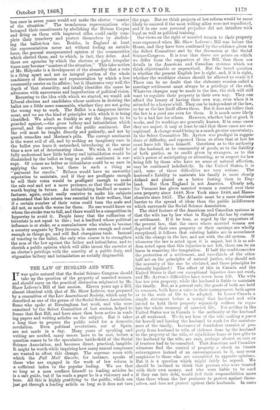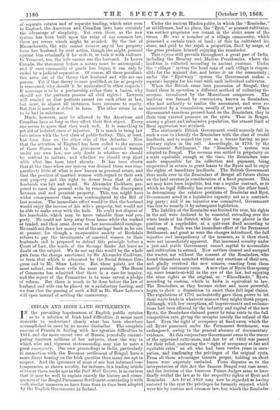THE LAW OF HUSBAND AND WIVE.
IT was quite natural that the Social Science Congress should take up the question of the property of married women, and should carry on the practical discussion originated by Mr. Shaw Lefevre's Bill of last session. Eleven years ago a Bill, almost identical with that of Mr. Shaw Lefevre, was prepared by a committee of the Law Amendment Society, which may be described as one of the germs of the Social Science Association. Some who spoke at Birmingham last week, and who were examined by the Select Committee of last session, helped to frame that first Bill, and have since then been active in read- ing papers and writing articles on the subject. But it takes a long time to prepare the public mind for a domestic revolution. Even political revolutions, out of Spain, are not made in a day. Many years of speaking and writing are needed, many sneers have to be met, before a question ceases to be the speculative battle-field of the Social Science Association, and becomes direct, practical, tangible. It might be worth while inquiring how many annual congresses are wanted to effect this change. The supreme scorn with which the Pall Mall Gazette, for instance, speaks of those who are engaged in the work of law reform is a sufficient index to the popular feeling. We see that so long as a man confines himself to leading articles he is a safe guide, but if he reads a paper he is a visionary and a bore. All this is highly gratifying to the public, which can just get through a leading article so long as it does not turn
the page. But we think projects of law reform would be more likely to succeed if the most willing allies were not repudiated, and if in one case personal prejudice did not interfere with legal as well as political training.
Our views on the right of married women to their property were expressed when Mr. Shaw Lefevre's Bill was before the House, and they have been confirmed by the evidence given to the Select Committee and by the discussion at the Social Science Congress. It is truo that there are points on which we differ from the supporters of the Bill, that there are details in the American and Canadian systems which we think objectionable or unpractical. But the broad question is whether the present English law is right, and, if it is right, whether the wealthier classes should be allowed to evade it? There can be no doubt that the elaborate evasion called a marriage settlement must always be a privilege of the rich. Whatever changes may be made in the law, the rich will still want to regulate their property in their own way. They can afford the luxury of having their own way, even when it is attended by a lawyer's bill. They can be independent of the law, so far as the law itself allows them. But it does not follow that the law is a good one even for them. It is much more likely to be a bad law for others. However, whether bad or good, it works, and its workings are generally known. If in some cases they are unjust, it may at least be said that those cases are ex- ceptional. A change would bring in a much greater uncertainty. In the Select Committee Mr. Ayrton was prodigal in sugges- tions of difficulty, and repeated them so often that at last he must have felt them himself. Questions as to the authority of the husband, as to community of goods, as to the liability of both parties, as to credit given by strangers, as to the wife's power of anticipating or alienating, as to respect for law being felt by those who have no sense of natural affection, may be continued indefinitely. In the United States, it is said, none of these difficulties are very serious. The husband's liability to maintain his family is more clearly defined and placed on a better footing than in Eng- land. But then England is not America. Clearly not, for Vermont has given married women a control over their own property since 1840, New York since 1848, and Massa- chusetts since 1857. The Atlantic must be a more obstinate barrier to the spread of ideas than the public indifference which surrounds the Social Science Association.
The chief feature of the American and Canadian systems is that the wife has by law what in England she has by custom or settlement. If it be true, as urged by the supporters of the present law, that the cases where married women are deprived of their own property or their earnings are wholly exceptional, it follows that existing habits are in accordance with the change in the law, and not with the old system. If whenever the law is acted upon it is unjust, but it is so sel- dom acted upon that this injustice is not felt, there can be no harm in removing the temptation. If half the world concedes the protection of a settlement, and two-thirds of the other half act on the principles of natural justice, why should not the necessity of the one be obviated, and those principles be formally legalized ? The effect of this in Canada and the United States is that our exceptional injustice does not exist, and Mr. Ayrton's difficulties have never been felt. The wife has her own property, while the husband is liable to maintain the family. But, as a general rule, the goods of both are held in common, both have a voice in their management, both agree as to the scale of life to be adopted. In Lower Canada a simple statement before a notary that husband and wife intend to hold their property separately suffices to regu- late the whole economy of married life. Yet neither in the United States nor in Canada is the authority of the husband at all weakened. We do not hear of the wife making a purse for herself and leaving the husband to work for the mainten- ance of the family. Instances of fraudulent transfer of pro- perty from husband to wife, of violence done by the husband to the property of the wife, of injudicious loans or free gifts to the husband by the wife, are rare, perhaps almost as rare as if trustees had to be consulted. That American and Canadian witnesses find the control of property a check on female extravagance instead of an encouragement to it, may seem suspicious to those who are committed to opposite opinions. But it is a question which might fairly be argued. We should be inclined to think that persons who were trusted with their own money, and who were liable to be sued if they ran into debt, would feel their responsibilities more than those whom the law professes to protect against them- selves, and does not protect against their husbands. In cases of separate estates and of separate trading, which exist even in England, the American and Canadian laws have certainly the advantage of simplicity. Yet even there, as the new system has been built upon the ruins of our common law, there are errors which might be avoided. By the law of Massachusetts, the wife cannot recover any of her property from her husband by civil action, though she might proceed against him criminally if he stole it, or took it with violence. In Vermont, too, the wife cannot sue the husband. In Lower Canada, the statement before a notary must be antenuptial ; and if once community of goods has begun, it can only be ended by a judicial separation. Of course, all these peculiari- ties arise out of the theory that husband and wife are one person. Yet if that theory is once qualified, so far as property is concerned, why should it be maintained in other respects ? If marriage is to be a partnership rather than a fusion, why should not the partners possess all civil rights ? Lawyers will remind us that partners cannot sue each other at law, but must, in almost all instances, have recourse to equity. But this is merely a defect in form. The other seems to us to be bad in substance.
Much, however, may be allowed to the American and Canadian laws so long as they effect their first object. Every one seems to agree that they work well. It is something to get rid of isolated cases of injustice. It is much to bring law into unison with the best class of public feeling. This, at least, has .been done on the other side of the Atlantic. Now that the attention of England has been called to the success of those States and to the grievances of married women under our own law, our only doubt is whether we should be content to imitate, and whether we should stop short with what has been tried already. It has been shown that at the time when our system was devised there was com- paratively little of what is now known as personal estate, and that the position of married women with regard to their own real property and the right to dower from that of their husbands was fair and equal. Sir Alexander Cockburn pro- posed to meet the present evils by removing the discrepancy between real and personal property. This, too, might have wider consequences than were contemplated by the Bill of last session. The immediate effect would be that the husband would enjoy the income of his wife's property, but would not be able to make away with the bulk. He could not dispose of her leaseholds, which may be more valuable than real pro- perty. He could not keep away from home while she worked or traded, and then come down on her accumulated earnings. He could not draw her money out of the savings' bank as he can at present, for though a co-operative society at Rochdale refuses to pay the investments of married women to their husbands, and is prepared to defend this principle before a Court of Law, the words of the Savings' Banks' Act leave no doubt on the subject. We do not say this would be the whole gain from the change sanctioned by Sir Alexander Cockburn, or from that which is advocated by the Social Science Con- gress and by Mr. Shaw Lefevre. But these points are the most salient, and these evils the most pressing. The House of Commons has admitted that there is a case for inquiry, and the report of the Committee is to some extent a pledge of reform. But there is much to be done before the law of husband and wife can be placed on a satisfactory footing, and we fear that the passing of such a Bill as Mr. Shaw Lefevre's will open instead of settling the controversy.



































 Previous page
Previous page